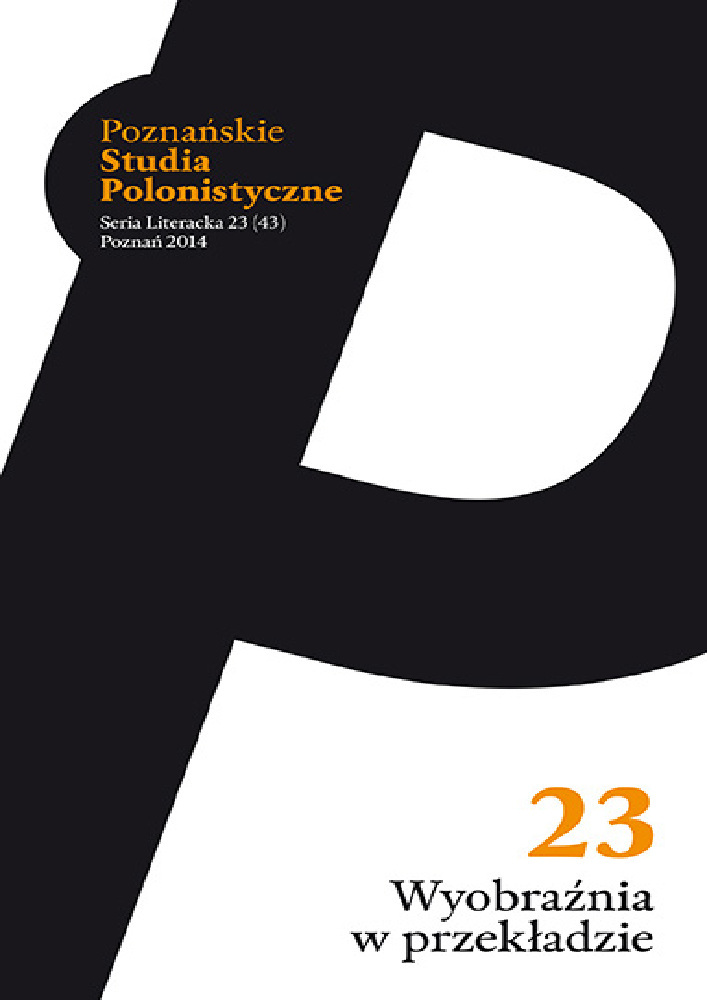Abstrakt
The essay is devoted to the life and work of Zofia Chądzyńska, with special focus on three manifestation of her intellectual activity: reading, writing, and translation, and their linguistic relations. The complicated post-war vicissitudes forced the writer to frequent changes in her way of life, and required an effort to adapt to the new reality. Chądzyńska did different jobs, and often changed her place of residence. The point of departure for the present discussion is her work at white-wash laundry in Buenos Aires. The laundry serves as a metaphor for moving from one linguistic space to another, and both spaces seem to be rigidly isolated from one another for Chądzyńska. The essay also refers to James Clifford’s On Ethnographic Self-Fashioning: Conrad and Malinowski. The anthropologist claims that each sphere of life is allotted to a different language: native, transgressive, and the language of restraint. The languages of both authors discussed by Clifford entered into various interferences, however, or replaced one another and created new connections. In Chądzyńska, it is definitely more difficult to see such relations, and her strong self-fashioning techniques reinforce the impression of radical transit from one language sphere to another. The author’s autobiography and her numerous autobiographical acts of expression also provide evidence for research in translation work, which in Chądzyńska can be analysed, for example, in the feminist context.Bibliografia
Bassnett S., Od komparatystyki literackiej do translatologii, tłum. A. Pokojska, w: Niewspółmierność. Perspektywy nowoczesnej komparatystyki, red. T. Bilczewski, Kraków 2010.
Byłam awanturnicą (archiwalne nagrania Zofii Chądzyńskiej w Polskim Radiu), http://www.polskieradio.pl/8/195/Artykul/547620, dostęp: 20 czerwca 2012.
Chądzyńska Z., Co mi zostało z tych lat…, Łódź 2003.
Clifford J., O etnograficznej autokreacji: Conrad i Malinowski, tłum. M. Krupa, w: Postmodernizm. Antologia przekładów, red. R. Nycz, Kraków 1998.
Gajewska A., Tłumaczenie feminizmu, „Przekładaniec” 2010, nr 2.
Kubiak M., Gra w słowa. Jubileusz Zofii Chądzyńskiej, „Tygodnik Powszechny” 2002, nr 10.
Kubiak M., Ten błysk, rytm, magia słów. O Zofii Chądzyńskiej «24.II.1912 –
–23.IX.2003», „Zeszyty Literackie”, 2004, nr 85.
Piątkowska M., Zofia Chądzyńska: Nikomu zostawiam nic, „Wysokie Obcasy” [dodatek], „Gazeta Wyborcza” 2003, nr 38.
Walka o sławę. Korespondencja Witolda Gombrowicza z Józefem Wittlinem, Jarosławem Iwaszkiewiczem i Arturem Sandauerem, red. J. Jarzębski, Kraków 1996.
Licencja
Autorzy
Autorzy tekstów przyjętych do publikacji w czasopiśmie „Poznańskie Studia Polonistyczne. Seria Literacka” są zobowiązani do wypełnienia, podpisania i odesłania na adres redakcji umowy o udzielenie nieodpłatnej licencji do utworów, z zobowiązaniem do udzielania sublicencji CC.
Zgodnie z umową, autorzy tekstów opublikowanych w czasopiśmie „Poznańskie Studia Polonistyczne. Seria Literacka” udzielają Uniwersytetowi im. Adama Mickiewicza w Poznaniu niewyłącznej i nieodpłatnej licencji oraz zezwalają na użycie sublicencji Creative Commons Attribution-NoDerivatives 4.0 International (CC BY-ND 4.0).
Autorzy zachowują prawa do dalszego, swobodnego rozporządzania utworem.
Użytkownicy
Zainteresowani użytkownicy internetu uprawnieni są do korzystania z utworów opublikowanych od 2016 roku w „Poznańskich Studiach Polonistycznych. Serii Literackiej” pod następującymi warunkami:
- uznanie autorstwa – obowiązek podania wraz z rozpowszechnionym utworem, informacji, o autorstwie, tytule, źródle (odnośniki do oryginalnego utworu, DOI) oraz samej licencji;
- bez tworzenia utworów zależnych – utwór musi być zachowany w oryginalnej postaci, nie można bez zgody twórcy rozpowszechniać np. tłumaczeń, opracowań.
Do wszystkich tekstów opublikowanych przed 2016 r. prawa autorskie są zastrzeżone.
Inne
Uniwersytet im. Adama Mickiewicza w Poznaniu zachowuje prawo do czasopisma jako całości (układ, forma graficzna, tytuł, projekt okładki, logo itp.).
